Conversion
![[shutterstock: 1479521933, ZinetroN]](https://e3mag.com/wp-content/uploads/2021/04/shutterstock1479521933ZinetroN.jpg)

The automotive market has undergone significant changes in recent years. Electric cars, disruptive market players such as Tesla, and completely new mobility concepts such as the sharing economy are leading to ever greater pressure for change.
The introduction of S/4 is an important basis for digital transformation for companies so that they can respond adequately to changing market conditions and develop new business models. The associated change affects all players in the automotive industry.
From development to production to sales, all central areas are affected. Finally, completely new competencies are also required in the course of electrification and digitization. A common reaction resulting from uncertainty is defensiveness.
Care should be taken not to interpret such defensiveness as something negative, such as a lack of motivation or inability, but to find out what lies behind the symptoms. This analysis is worthwhile. It is the only way to accompany complex digitization projects with suitable change management measures, identify resistance at an early stage and, ideally, transform it into a positive drive.
With the introduction of a new ERP system, these automatic mechanisms are disrupted for the time being. Users have to relearn the system and - if they do not immediately recognize improvements for their everyday work - initially have concerns about the increased effort.
Resistance describes defensive attitudes that are (apparently) rationally justified. This is, for example, the rejection of an S/4 transformation on the basis of experience from other comparable projects or on the basis of consequences for the workplace or the role of the individual that are difficult to foresee. In extreme cases, change projects are sabotaged and badmouthed.
At the corporate level, resistance can be derived culturally. The agile corporate culture with decentralized responsibility and decision-making authority, flat hierarchies, and interdisciplinary collaboration, which is often considered necessary for an S/4 implementation, is rated as below average in the automotive industry.
This means that an S/4 implementation, particularly in classic organizational and management structures such as those we observe in the automotive sector, is associated with a more profound cultural change than in companies with agile structures.
This is particularly true if such an introduction is understood not only as a technological change, but as a comprehensive business transformation that also affects the structural and process organization and the type of collaboration.
For example, employees have technical reservations or are skeptical about a complex ERP implementation because they do not consider themselves to be sufficiently qualified. Rather soft factors refer to their own "hidden agenda", which is linked to their personal career path or reputation in the existing organizational structure.
Particularly in large organizations in the automotive industry, a patchwork of many improvised workarounds can then arise, which significantly impairs the effectiveness of an S/4 transformation.







